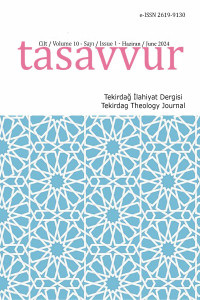Toplumun Sığınma ve Korunma Aracı Olarak Din: Kovid-19 ile Mücadele Sürecine Yönelik Nitel Bir Araştırma
Religion As a Tool of Asylum and Protection of Society: A Qualitative Research on the Covid-19 Process
Author(s): Fatih Baş, Durali KaracanSubject(s): Sociology, Social psychology and group interaction, Health and medicine and law, Sociology of Religion
Published by: Tekirdağ Namık Kemal Üniversitesi İlahiyat Fakültesi
Keywords: Social Psychology; Religion; Society; Individual; Coronavirus;
Summary/Abstract: The purpose of this article is to examine the role that religion played during the COVID-19 pandemic, particularly in relation to people who were infected with the virus, as well as the impact it had on their religious beliefs and practices. The article begins by providing a brief overview of the pandemic process. It then goes on to analyse the relationship between daily life, society, and religion. Furthermore, it addresses the role of religion in the daily lives of individuals and society. The article discusses that the religious positioning of individuals and society during the pandemic can be best understood by examining the experiences of those who were significantly impacted by the coronavirus. Researchers have primarily examined the coronavirus epidemic's effects on health, the economy, and society. Religion, on the other hand, has played a critical role in addressing the significant challenge that humanity has been confronting. Additionally, there is a belief that both individuals and society have a heightened desire to establish a stronger connection with religion in order to address the challenges posed by the coronavirus pandemic. The research focuses primarily on understanding and shedding light on this phenomenon. The research was conducted using a phenomenological approach, which is a sort of qualitative research methodology. The data collection process involved conducting in-depth interviews with a sample of ten individuals who suffered from the coronavirus. These interviews aimed to uncover the connections between individuals and society with respect to religion during the COVID-19 period. The research was examined in three distinct phases: religion at the beginning of the COVID-19 pandemic, religion during the pandemic, and religion post-pandemic. The results have demonstrated that during the epidemic disease process, society and individuals experience a variety of emotions and thoughts, including anxiety, panic, uneasiness, an inability to manage the disease, and fear of death. Furthermore, the findings revealed that there is a strong inclination among individuals to seek solace in religion and the divine as a means of managing these feelings and thoughts. Additionally, the research results demonstrated that individuals reevaluated their relationship with religion and the divine during the epidemic, resulting in an increased inclination towards religious beliefs.
Journal: Tasavvur Tekirdağ İlahiyat Dergisi
- Issue Year: 10/2024
- Issue No: 1
- Page Range: 177-211
- Page Count: 35
- Language: Turkish

